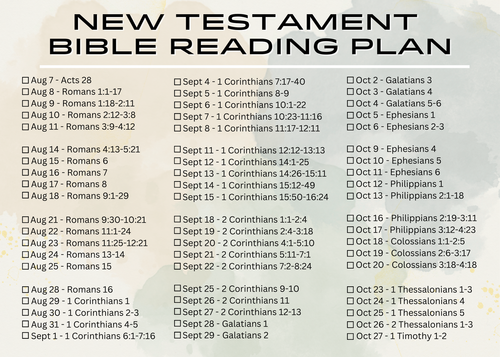Not As The Word Of Men
1 Thessalonians 1:1-3:13
The church in Thessalonica was founded as Paul and his team presented the gospel in the synagogue. Some members believed in Christ but faced opposition from the Jewish community. Concerned for the church's well-being, Paul, Silvanus, and Timothy wrote to these recent converts to strengthen their faith. Paul expresses deep affection and gratitude, highlighting their work, labor, and steadfastness. He emphasizes how the gospel came to them with power, the Holy Spirit, and conviction. They turned from idols, imitated Christ, and served as an example to other churches while awaiting Christ's return. This strong response confirms their election and salvation.
Like the Thessalonians, Paul, Silvanus, and Timothy endured persecution for the gospel's sake. Despite the hardships, the Thessalonians responded with joy from the Holy Spirit. This exemplary response made them a model for other churches. The Thessalonians spread the gospel and remained faithful to God, gaining a reputation for their faithfulness. The word of the Lord has reached far and wide because of them. Paul appeals to their remembrance of the ministry conducted by him and his colleagues in Thessalonica. They endured suffering and mistreatment in Philippi but boldly proclaimed the gospel in Thessalonica. This boldness came from their relationship with God as bearers of the gospel. Paul was also encouraged to share the gospel of God.
Paul distinguishes his ministry from false messengers to avoid unfair associations with deceitful itinerant teachers. These messengers are faithful representatives of God, approaching their ministry with pure motives and not seeking glory from humans. Their gain and glory come solely from God. While Paul acknowledges his right to receive compensation as an apostle of Christ, he willingly relinquishes these rights for the sake of the gospel and the benefit of the churches.
Paul, Silvanus, and Timothy liken themselves to nurturing mothers caring for their newborns. They approach the Thessalonians not only to share the good news of Jesus but also to share themselves. Paul urges them to remember the diligence with which his team worked while in Thessalonica. Paul supported himself while laboring in his ministry to avoid being a burden.
Paul and his colleagues also display the care and guidance of loving fathers toward their children. Like fathers in ancient Jewish and Greek cultures, they educate and train the Thessalonians in proper behavior. Paul emphasizes their instruction by using three overlapping terms: "exhorted," "encouraged," and "charged." His specific exhortation is for Christians to live according to God's approval.
Paul refers to the gospel as the "word of God," contrasting it with any human-originated message. Though God reveals his gospel through human agents, the message is rooted in God's revelation in Christ. "Believers" are those who have faith in Christ and trust him in all aspects of life. Christians imitate Christ and learn from observing other Christians who imitate him. The Thessalonians serve as a model for other churches and imitate believers in Judea.
Unbelieving Jews who oppose the Messiah invoke divine displeasure. Local opposition in Thessalonica led to Paul's early departure, but he assured the church that the separation would be short-lived. Paul attributes his failure to return to satanic spiritual opposition. The church is Paul's joy, crown of boasting, and glory. Timothy is Paul's brother and God's coworker, and the church should receive him as Paul's delegate. Paul rejoices to learn that the Thessalonians are thriving in the Lord. He highlights their faith, love, and remembrance of Paul and his team. Paul and his colleagues continue to pray for an opportunity to return to Thessalonica and strengthen the church's faith. Paul prays for the congregation to be established in love and to stand firm in the judgment at Christ's return.
Like the Thessalonians, Paul, Silvanus, and Timothy endured persecution for the gospel's sake. Despite the hardships, the Thessalonians responded with joy from the Holy Spirit. This exemplary response made them a model for other churches. The Thessalonians spread the gospel and remained faithful to God, gaining a reputation for their faithfulness. The word of the Lord has reached far and wide because of them. Paul appeals to their remembrance of the ministry conducted by him and his colleagues in Thessalonica. They endured suffering and mistreatment in Philippi but boldly proclaimed the gospel in Thessalonica. This boldness came from their relationship with God as bearers of the gospel. Paul was also encouraged to share the gospel of God.
Paul distinguishes his ministry from false messengers to avoid unfair associations with deceitful itinerant teachers. These messengers are faithful representatives of God, approaching their ministry with pure motives and not seeking glory from humans. Their gain and glory come solely from God. While Paul acknowledges his right to receive compensation as an apostle of Christ, he willingly relinquishes these rights for the sake of the gospel and the benefit of the churches.
Paul, Silvanus, and Timothy liken themselves to nurturing mothers caring for their newborns. They approach the Thessalonians not only to share the good news of Jesus but also to share themselves. Paul urges them to remember the diligence with which his team worked while in Thessalonica. Paul supported himself while laboring in his ministry to avoid being a burden.
Paul and his colleagues also display the care and guidance of loving fathers toward their children. Like fathers in ancient Jewish and Greek cultures, they educate and train the Thessalonians in proper behavior. Paul emphasizes their instruction by using three overlapping terms: "exhorted," "encouraged," and "charged." His specific exhortation is for Christians to live according to God's approval.
Paul refers to the gospel as the "word of God," contrasting it with any human-originated message. Though God reveals his gospel through human agents, the message is rooted in God's revelation in Christ. "Believers" are those who have faith in Christ and trust him in all aspects of life. Christians imitate Christ and learn from observing other Christians who imitate him. The Thessalonians serve as a model for other churches and imitate believers in Judea.
Unbelieving Jews who oppose the Messiah invoke divine displeasure. Local opposition in Thessalonica led to Paul's early departure, but he assured the church that the separation would be short-lived. Paul attributes his failure to return to satanic spiritual opposition. The church is Paul's joy, crown of boasting, and glory. Timothy is Paul's brother and God's coworker, and the church should receive him as Paul's delegate. Paul rejoices to learn that the Thessalonians are thriving in the Lord. He highlights their faith, love, and remembrance of Paul and his team. Paul and his colleagues continue to pray for an opportunity to return to Thessalonica and strengthen the church's faith. Paul prays for the congregation to be established in love and to stand firm in the judgment at Christ's return.





Recent
Archive
2023
January
Happy New Year!He Will Save His People From Their SinsMy Beloved SonTemptation And MinistryThe SermonLeaving, Lying, Limits, Love, Largesse, and The Lord's PrayerTreasure, Anxiety, and JudgmentAstonishing AuthorityStorms, Demons, and HealingJesus Is CompassionateHis Eye Is On The SparrowSwords, Rewards, and MessengersThe Lord of the SabbathBlasphemy, Bad Trees, Signs, and FamilyStories, Sowers, and SoilsParables, Hidden Treasure, and RejectionFame, Food, Fear, Faith, and FringeReal Issues And The Power Of GodDying To Find LifeLike The SunChildren, Temptation, Sheep, And ForgivenessMarriage, Kids, And MoneyTo Serve And Give His Life
February
The ArrivalStories That StingQuestion TrapsHidden Motives And LamentThe End...?UnexpectedReady?Punishment, The Plot, And PerfumeTreachery, Passover, and The CupBetrayal, Injustice, And DenialThe Field Of Blood And The GovernorCrucifixion And DeathAll AuthorityMark—The Beginning Of The GospelHealing, Preaching, And The Forgiveness Of SinEating With Tax Collectors, Fasting, The Sabbath, And An Escape BoatThe Twelve, Blasphemy, Family, And A ParableParables And PowerA Different Kind Of StormPower Had Gone Out
March
Death, Hunger, And MiraclesCommandment Or TraditionDo You Not Yet Understand?The Christ And A Glimpse Of His GloryUnbelief, Confusion, And SinDivorce, Children, And PossessionsTo Give His Life As A RansomHosannaThe Rejected Stone, Taxes, And The Great CommandmentDestruction And The EndNo One Knows, An Anointing, And A Promise To BetrayPassover And GethsemaneThe Kiss, Arrest, And DenialPilate, Simon, And The CrucifixionDeath, Burial, Resurrection, And What\'s NextTheophilus And A Visit From GabrielMary And The MagnificatBenedictusThe Arrival And The ShepherdsSimeon, Anna, And The SpiritFruits Keeping With Repentance And BaptismThe Wilderness, Nazareth, And CapernaumSimon's Mother-In-Law, Fishing, A Leper, And Sins
April
Tax Collectors, Fasting, Sabbath Controversies, And The TwelveWhy Do You Call Me Lord, Lord?Jesus Marveled, A Raised Son, And QuestionsA Sinful Woman And A ParableObeying The Word, A Storm, And DemonsTwelve Years, Twelve Apostles, And SpeculationGreater, Costly, And GloryNot Getting It, The Cost, And AppointedWoes, Neighbors, And What Is NecessaryHelp Us Pray And A Divided Kingdom?Signs, Lights, And WoesHypocrisy, Fear, A Fool, And AnxietyParables, Division, And The TimesWarnings, A Daughter Of Abraham, And Jerusalem, JerusalemA Son Or An Ox, Parties, And DiscipleshipLost ThingsThe Dishonest Manager, The Law, And Anguish In This FlameMillstones And Mustard SeedsPersistent Prayer, Humility, A Childlike Faith, And The Rich RulerEverything That Is Written, A Blind Beggar, And A Wee Little Man
May
A Parable, A Colt, A Prophecy, And A CleansingAuthority, Wicked Tenants, And TaxesThings To Beware Of And WidowsDestruction, Persecution, The Son Of Man, And WatchingThe Plot, Betrayal, Lord's Supper, And Inappropriate BehaviorPrediction, Fulfillment, Agony, Betrayal, And DenialMistreated, Taken Before The Council, Pilate, Herod, And Delivered To Be CrucifiedCrucifixion, Death, And BurialHe Is Not HereDisbelieved For JoyIn The Beginning…The Lamb Of God And A WeddingZeal, What's Inside, And Born AgainHe Must Increase
Categories
no categories
Tags
no tags
